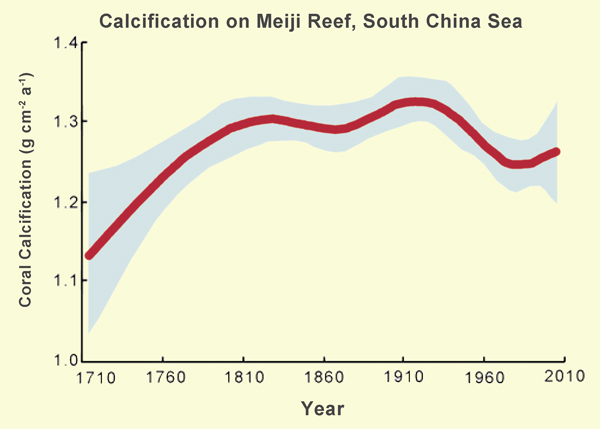Reference
Shi, Q., Yu, K.F., Chen, T.R., Zhang, H.L., Zhao, M.X. and Yan, H.Q. 2012. Two centuries-long records of skeletal calcification in massive Porites colonies from Meiji Reef in the southern South China Sea and its responses to atmospheric CO2 and seawater temperature. Science China Earth Sciences 55: 10.1007/s11430-011-4320-0.
Background
The authors write that "rising atmospheric CO2 and global warming are regarded as fatal threats to coral reefs," noting that "the IPCC has reported that by the end of this century, coral reefs will be the first ecological system that will become extinct," citing Wilkinson (2004). However, they say "others contend that rising seawater temperature is conducive to enhanced coral calcification, and increased calcification will be higher than the decline caused by rising CO2," so that "coral calcification will increase by about 35% beyond pre-industrial levels by 2100, and no extinction of coral reefs will occur in the future," citing McNeil et al. (2004). So who's right?
What was done
In an attempt to shed some light on this important question, in late May of 2004 and 2007 Shi et al. extracted core samples of coral skeletons from several massive live and dead Porites lutea colonies comprising part of the Meiji Reef in the southern South China Sea, after which they analyzed their skeletal calcification rates by means of X-ray photography, which enabled them to construct a nearly three-century-long history of coral calcification rate for the period 1716-2005.
What was learned
The results of the six scientists' efforts are depicted in the figure below.

The long-term history of coral calcification rate on Meiji Reef. Adapted from Shi et al. (2012).
As best we can determine from the Chinese scientists' graph, over the period of time depicted - when climate alarmists claim the world warmed at a rate that was unprecedented over the past millennium or two, and when the atmosphere's CO2 concentration rose to values not seen for millions of years - the two "fatal threats to coral reefs," even acting together, could not prevent coral calcification rates on Meiji Reef from actually rising by about 11% over the past three centuries.
What it means
It certainly looks like the infamous IPCC has gotten it all wrong when it comes to predicting the effects of rising temperature and atmospheric CO2 concentration on coral calcification rates ... because you better believe that nature's got it right.
References
McNeil, B.I., Matear, R.J. and Barnes, D.J. 2004. Coral reef calcification and climate change: The effect of ocean warming. Geophysical Research Letters 31: 10.1029/2004GL021541.
Wilkinson, C. 2004. Status of Coral Reefs of the World: 2004. Australian Institute of Marine Science Press, Townsville, Australia.
Reviewed 16 May 2012



